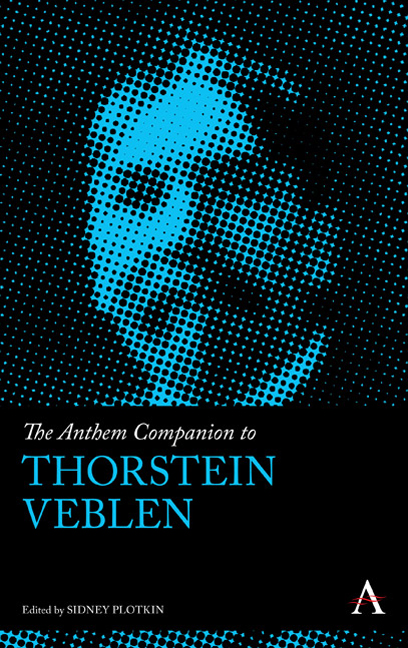Book contents
- Frontmatter
- Dedication
- Contents
- Acknowledgments
- Introduction: Thorstein Veblen's Elusive Project
- Part I METHOD, PHILOSOPHY AND VALUES
- Contents
- Part II CAPITALISM, SOCIAL STRUCTURE AND POLITICS
- Chapter Six Reigniting the Anthropology of Capitalism: Returning to Veblen, after Postmodernism, after Postcoloniality
- Chapter Seven On the Social Origin of the Leisure Class in Turkey: For a Veblenian Turn in the Marxian Research Program of Turkish Studies
- Chapter Eight Veblen's Localism and Its Ambiguities
- Chapter Nine Learning from Veblen's Masterless Man for Grassroots Democratic Change
- List of Contributors
- Index
Chapter Six - Reigniting the Anthropology of Capitalism: Returning to Veblen, after Postmodernism, after Postcoloniality
from Part II - CAPITALISM, SOCIAL STRUCTURE AND POLITICS
Published online by Cambridge University Press: 10 January 2018
- Frontmatter
- Dedication
- Contents
- Acknowledgments
- Introduction: Thorstein Veblen's Elusive Project
- Part I METHOD, PHILOSOPHY AND VALUES
- Contents
- Part II CAPITALISM, SOCIAL STRUCTURE AND POLITICS
- Chapter Six Reigniting the Anthropology of Capitalism: Returning to Veblen, after Postmodernism, after Postcoloniality
- Chapter Seven On the Social Origin of the Leisure Class in Turkey: For a Veblenian Turn in the Marxian Research Program of Turkish Studies
- Chapter Eight Veblen's Localism and Its Ambiguities
- Chapter Nine Learning from Veblen's Masterless Man for Grassroots Democratic Change
- List of Contributors
- Index
Summary
It is a condition, not a theory, that confronts us.
Thorstein Veblen, from “The Passing of National Frontiers” 1918The time has come for a new anthropology of capitalism, one that renews the great insights from early twentieth- century American social theory, without forgetting everything we have learned since from Marxist and other radical political economies, and their postmodern and postcolonial critique. This chapter argues, as fiercely as necessary, that it is now urgent that we read symptomatically the American penchant to find social theory roots in Europe, especially in light of the limits of the most common current projects that launch from Marcel Mauss's very French attempt to synthesize rationalism and romanticism, or worse, from confused, German Weimar- era critiques of capitalism, notably the creative romanticism of Walter Benjamin and even the fascist, thundering classicism of Carl Schmitt. For too long Americans in particular, and global scholarship more generally, have ignored the most interesting critical traditions in American social theory in preference for finding History capital- H somewhere else, even the arguments, notably those of Veblen, that have already had the greatest positive impact.
This chapter addresses the high- risk, high- value prospects in asking Thorstein Veblen for help in reigniting critical scholarship on capitalism. The premise, which I will review with some specificity, is that the critical anthropologies following Eric Wolf, Sidney Mintz and others into the “new, historical political economies” of anthropology in the 1980s reached quick limits when they attempted to ground studies of real global relations of exploitation in a labor theory of value, requiring labor, in the words of David Harvey, to always be the “form- giving fire.” This material turn did more damage than necessary to cultural theory and comparative ethnography, and was in turn entirely vulnerable to devastating postmodern critiques by Nicholas Dirks, Ann Stoler, David Graeber, Bill Maurer and others, above all Michael Taussig, who demonstrated conclusively that under colonial conditions, political economy was a discourse that hid much, and excused and enabled as much as it revealed. But postcolonial theory, in its efforts to find more general social theory in the impasses of postcoloniality, could ethically orient the less grounded politics of postmodernism but could not, in fact, launch a reconsideration of capitalist institutions and their dynamics beyond a recurrent, overdetermined demonstration of the moral catastrophe they entailed.
- Type
- Chapter
- Information
- The Anthem Companion to Thorstein Veblen , pp. 151 - 188Publisher: Anthem PressPrint publication year: 2017



